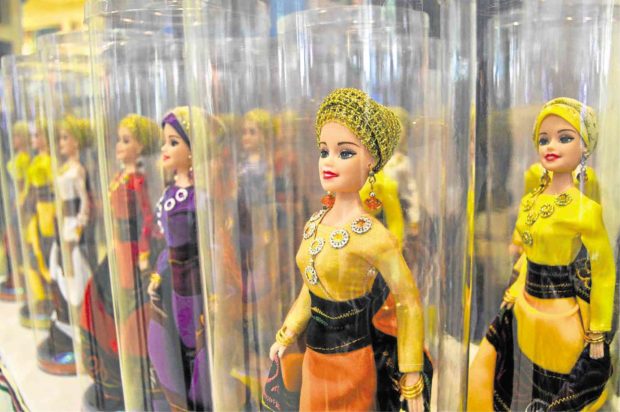Sarimanok rises from the ashes

Darangen dolls at the Sarimanok exhibit showcase how to properly use “malong” (tube skirt). —JIGGER JERUSALEM
CAGAYAN DE ORO CITY—Not much survived the war against Islamic State-inspired terrorists in Marawi City in terms of structures. Not even its only shop that sold Maranao crafts probably among the rarest in the country.
Sarimanok Brass and Antique shop was among those destroyed in the predominantly Muslim city, but its owners refused to sulk in a corner and grieve.
They brought out the best works of Maranao craftsmen at the “Kawyagan sa Marawi” (Livelihood of Marawi) exhibit in a mall here in an effort to impart an important message: Help the city get back on its feet.
A feel of Marawi
Mall goers were greeted by displays of Maranao-made wooden “baul” (treasure chest), the kris and other Maranao blades, gongs and other musical instruments, Darangen dolls, “malong” (tube skirt) and brassware.
In the background were framed and blown up pictures depicting life in Marawi after the war.
Noraifa Sumandar, assistant manager of Sarimanok, said the shop owners had teamed up with Ayala Foundation Inc. to set up the exhibit which offered the Maranao crafts for sale, generating funds for the psychosocial therapy of war survivors.
“This is our way of telling them not to give up,” Sumandar said.
She said while survivors were still suffering from the war’s impact, it was important for people to “get back on their feet.”
‘Nothing’s impossible’
“If you have the talent, the craftsmanship, there’s nothing impossible,” she said.
On Monday alone, the sale of Maranao-made products in the exhibit generated at least P80,000.
Sarimanok, the store long famous for its traditional Maranao ware, had lost its shop in Datu sa Dansalan village to the fighting.
Marawi residents started fleeing on May 23 at the start of the war that would end in October.
Many displaced residents, among them the craftsmen who supply Sarimanok with its products, had not returned home.
Sarimanok went out of its way to search for the craftsmen in Tugaya, a town in Lanao del Sur province.
Materials for the products, like wood and fabric, were from local sources.
Sumandar said the process of making Maranao crafts had been passed down through generations in Tugaya.














